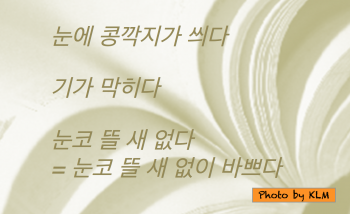Baffled by Idiomatic Expressions? Posted by Kyung-Hwa on Jun 7, 2017 in Korean Language, Vocabulary
Have you ever scratched your head in confusion due to certain expressions in Korean, even though you knew all the words in the expressions? In this post, we will explore some idiomatic expressions that are often used by native Korean speakers.

When I first heard the expression “I will take a rain check” in English, I felt baffled although I knew every single word in this expression. Idiomatic expressions are figurative, so they are hard to understand unless you are familiar with their actual meanings. In this post, I would like to introduce several idiomatic expressions that you will often hear from native Korean speakers. If you enjoy watching Korean dramas or TV shows, you will also hear these expressions frequently.
- 눈에 콩깍지가 씌다 (basic form): It literally means that a 콩깍지 (bean pod) has been 씌다 (put on) an 눈 (eye). Its actual meaning is that someone is blinded by love and doesn’t see any flaws in the other person. You will hear “눈에 콩깍지가 씌였어 ” (informal) or “눈에 콩깍지가 씌였어요” (polite).
- 기가 막히다 (basic form): It literally means that the 기 (energy flow) in your body 막히다 (is blocked). Interestingly, this expression can be used in opposite situations.
1. The first example is within a negative situation. It can be used when you are speechless or dumbfounded because of an unbelievable situation.
ex) 알렉스는 시험공부를 하나도 안 했는데 또 100점을 받았어요.
정말 기가막혀요. 난 겨우 70점 받았는데…
(Alex did not study for the test at all, but he scored 100 again.
I am really speechless. I received only 70… – polite form)
2. The second example is used within a positive situation. It can be used when something is excellent or tastes very delicious.
ex) 너희 엄마 김치는 기가 막혀!
(Your mother’s Kimchi is unbelievably delicious! – informal form)
새로 나온 그 차 정말 기가 막혀요!
(That new car is really awesome! – polite form)
- 눈코 뜰 새 없다 = 눈코 뜰 새 없이 바쁘다 (basic form): It literally means that 눈코 (eyes and a nose) 뜰 새 없이 (no time to open) 바쁘다 (being busy). Its actual meaning is equivalent to “I don’t have time to catch my breath” in English.
ex) A: 요즘 어떻게 지내세요?
(How are you doing these days? – polite)
B: 눈코 뜰 새 없어요.= 눈코 뜰 새 없이 바빠요.
(I don’t have time to catch my breath. – polite)
I hope you won’t have to scratch your head anymore when you hear the above examples next time. When someone asks you “How are you doing these days?” maybe you can use this expression- 눈코 뜰 새 없어요. = 눈코 뜰 새 없이 바빠요. (I don’t have time to catch my breath.) instead of just “바빠요. (I am busy.)”
감사합니다! (Thank you!)

Build vocabulary, practice pronunciation, and more with Transparent Language Online. Available anytime, anywhere, on any device.



